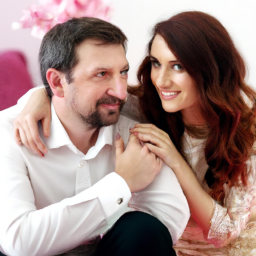Marriage is a beautiful bond between two individuals, built on love, trust, and commitment. However, even the strongest marriages can face rough patches that require repair and rejuvenation. While seeking professional counseling is often recommended, there are alternative approaches to mending a marriage without the involvement of a counselor. In this blog post, we will explore effective strategies and techniques that can help couples navigate through challenges and rebuild their relationship, focusing on practical ways to repair marriage without counseling.
Effective Communication Strategies for Repairing a Marriage Without Counseling
Introduction
Marriage is a beautiful bond between two individuals, but it can also face challenges and difficulties. When problems arise, seeking professional counseling is often recommended. However, if you prefer to repair your marriage without counseling, there are effective communication strategies you can employ to strengthen your relationship. In this article, we will explore step-by-step strategies to help you repair your marriage without the need for counseling.
Understanding the Importance of Communication
Communication is the cornerstone of any successful relationship. It allows partners to express their feelings, needs, and concerns while fostering understanding and empathy. In a marriage, effective communication is crucial for resolving conflicts, building trust, and maintaining a deep emotional connection. By improving your communication skills, you can lay a strong foundation for repairing your marriage.
Here are some key strategies to enhance communication within your relationship:
1. Active Listening
Active listening involves fully focusing on your partner’s words and non-verbal cues. It requires giving your undivided attention, maintaining eye contact, and avoiding distractions. By listening attentively, you demonstrate respect and show that you value your partner’s thoughts and feelings. Avoid interrupting and allow your partner to express themselves fully before responding. This approach fosters open and honest communication, enabling both partners to feel heard and understood.
Additionally, paraphrasing what your partner has said can help clarify any misunderstandings and show that you genuinely comprehend their perspective. This technique also encourages further dialogue and prevents assumptions from escalating conflicts.
Remember, active listening is not about finding immediate solutions or offering advice. Instead, it is about creating a safe space for open and honest conversation.
2. Expressing Emotions Effectively
Emotions play a significant role in any relationship, and expressing them effectively is crucial for repairing a marriage. However, it’s important to express emotions in a constructive and non-confrontational manner. When discussing sensitive topics, use “I” statements to express how you feel, rather than blaming or criticizing your partner.
For example, instead of saying, “You never listen to me,” try saying, “I feel unheard when I share my thoughts and emotions.” This approach helps to avoid defensiveness and encourages your partner to empathize with your feelings. It also sets the stage for a productive conversation where both partners can work together to find solutions.
Furthermore, it is essential to control your emotions during discussions. Take a few deep breaths and remain calm, even if the conversation becomes heated. This will prevent the situation from escalating into an argument and allow for a more productive exchange of ideas.
3. Non-Verbal Communication
Non-verbal communication, such as body language and facial expressions, can often convey more than words alone. Paying attention to non-verbal cues can help you better understand your partner’s emotions and intentions. Likewise, being aware of your own non-verbal signals can ensure that your messages are received accurately.
During conversations, maintain an open posture, face your partner, and make eye contact. This demonstrates your engagement and interest in the discussion. Avoid crossing your arms or displaying defensive body language, as this can create barriers and hinder effective communication. Remember, non-verbal cues can either reinforce or contradict your verbal messages, so strive for consistency.
Additionally, be mindful of your tone of voice. Speak in a calm and respectful manner, even if you disagree with your partner. A harsh or condescending tone can escalate conflicts and hinder the repair process.
Conclusion
Repairing a marriage without counseling is possible by implementing effective communication strategies. Active listening, expressing emotions effectively, and paying attention to non-verbal communication are key components of successful communication within a relationship. By practicing these strategies, you can create a safe and supportive environment for open dialogue, understanding, and ultimately, the repair of your marriage. Remember, repairing a marriage takes time, patience, and effort from both partners, but with effective communication, you can rebuild a strong and fulfilling relationship.

Practical Steps and Techniques to Rebuild Trust in a Marriage Without Professional Help
Introduction
Trust is the foundation of any successful marriage. When trust is broken, it can be challenging to rebuild, but it is not impossible. While professional counseling can be beneficial, there are practical steps and techniques you can take to repair your marriage without seeking professional help. In this article, we will explore some effective strategies to rebuild trust and strengthen your relationship.
1. Open and Honest Communication
Communication is key when it comes to rebuilding trust in a marriage. It is essential to create a safe and open environment where both partners can express their feelings and concerns without fear of judgment or retaliation. Start by setting aside dedicated time for meaningful conversations.
Listen actively to your partner, allowing them to share their emotions and experiences. Avoid interrupting or becoming defensive. Acknowledge their feelings and validate their perspective, even if you disagree. This demonstrates empathy and shows that you value their thoughts and emotions.
Furthermore, be honest and transparent in your own communication. Share your own feelings and experiences, and be willing to admit your mistakes. Building trust requires vulnerability and authenticity.
2. Rebuilding Emotional Connection
Emotional connection is the backbone of a healthy marriage. To rebuild trust, it is crucial to re-establish emotional intimacy with your partner. Spend quality time together, engaging in activities that you both enjoy. This can be as simple as going for a walk, cooking a meal together, or watching a movie.
During these moments, focus on reconnecting emotionally. Share your dreams, goals, and fears with each other. Express your love and affection through both words and actions. Small gestures of kindness and appreciation can go a long way in rebuilding trust and strengthening your bond.
It is also essential to prioritize emotional support. Be there for your partner during challenging times, offering a listening ear and a shoulder to lean on. Show empathy and understanding, and avoid judgment or criticism.
3. Rebuilding Trust Through Actions
Actions speak louder than words when it comes to rebuilding trust. Consistency and reliability are key. Make a conscious effort to follow through on your commitments and promises. Be reliable and punctual.
Avoid engaging in behaviors that may erode trust further, such as lying, hiding information, or being secretive. Instead, be transparent and open. Share your thoughts, concerns, and experiences willingly.
Take responsibility for your actions and apologize sincerely when you make mistakes. Apologies should be heartfelt and accompanied by a commitment to change. Follow through on your promises and demonstrate your commitment to rebuilding trust.
4. Rebuilding Intimacy
Intimacy is an essential aspect of a healthy marriage. Rebuilding trust requires re-establishing both emotional and physical intimacy. Physical intimacy can help create a sense of closeness and connection.
Take the time to nurture your physical relationship. Engage in affectionate gestures, such as holding hands, hugging, and kissing. Be attentive to your partner’s needs and desires, and communicate openly about your own. Physical intimacy can help rebuild trust and create a stronger emotional bond.
However, it is important to note that physical intimacy should only be pursued when both partners feel comfortable and ready. Consent and mutual respect are crucial.
Conclusion
Rebuilding trust in a marriage without professional help is a challenging but achievable task. By following these practical steps and techniques, you can start the journey towards healing and strengthening your relationship. Remember, open and honest communication, rebuilding emotional connection, demonstrating trust through actions, and nurturing intimacy are key elements in repairing a marriage. With time, effort, and commitment from both partners, trust can be rebuilt, and your marriage can thrive once again.

Essential Tips for Healing Emotional Wounds and Restoring Intimacy in a Marriage Without Therapy
Marriage is a beautiful journey filled with love, companionship, and shared experiences. However, it is not uncommon for couples to encounter rough patches along the way. Emotional wounds can develop, and intimacy may suffer. While seeking professional counseling can be beneficial, there are steps you can take to repair your marriage without therapy. In this article, we will explore three essential tips that can help you heal emotional wounds and restore intimacy in your marriage.
1. Effective Communication
Communication is the cornerstone of any successful relationship. When emotional wounds arise, it is crucial to establish open and honest communication with your partner. Here’s how you can improve your communication:
Active Listening: Take the time to truly listen to your partner without interrupting or formulating your response. Show empathy and understanding by validating their feelings and experiences.
I-Statements: Instead of using accusatory language, express your feelings using “I” statements. For example, say, “I feel hurt when…” instead of “You always make me feel…”. This approach promotes understanding and avoids defensiveness.
Conflict Resolution: When conflicts arise, approach them as opportunities for growth rather than as a battleground. Focus on finding solutions together and compromise when necessary. Remember, you are a team.
By improving your communication skills, you create a safe and supportive environment for both you and your partner to express yourselves freely, fostering emotional healing and intimacy.
2. Rebuilding Trust
Trust is the foundation of a strong and healthy marriage. If trust has been broken, it is essential to rebuild it. Here are some steps to help you rebuild trust:
Transparency: Be open and transparent with your partner. Share your thoughts, feelings, and actions honestly. Avoid keeping secrets or hiding information that could damage trust further.
Consistency: Consistency is key in rebuilding trust. Follow through on your commitments and promises. Be reliable and dependable, showing your partner that they can count on you.
Forgiveness: Forgiveness is a powerful tool in healing emotional wounds. While it may be challenging, try to forgive your partner for past mistakes. Holding onto grudges will only hinder the healing process.
Patience: Rebuilding trust takes time. Be patient with yourself and your partner. Understand that trust is earned gradually through consistent actions and open communication.
By actively working on rebuilding trust, you create a solid foundation for emotional healing and the restoration of intimacy in your marriage.
3. Cultivating Intimacy
Intimacy goes beyond physical closeness; it encompasses emotional, intellectual, and spiritual connections. Cultivating intimacy in your marriage can help heal emotional wounds and strengthen your bond. Here are some ways to cultivate intimacy:
Quality Time: Make time for each other regularly. Engage in activities you both enjoy and create opportunities for meaningful conversations and shared experiences.
Emotional Vulnerability: Be open and vulnerable with your partner. Share your fears, dreams, and aspirations. Building emotional intimacy requires trust and a willingness to be authentic.
Physical Affection: Physical touch can foster emotional connection. Show affection through hugs, kisses, and cuddling. Small gestures of physical intimacy can go a long way in restoring closeness.
Shared Goals: Set goals together as a couple. Whether it’s planning for the future or working towards a common purpose, shared goals create a sense of unity and strengthen your bond.
By actively cultivating intimacy in your marriage, you create an environment of emotional healing and connection, allowing your relationship to thrive without therapy.
In conclusion, healing emotional wounds and restoring intimacy in a marriage without therapy is possible. By focusing on effective communication, rebuilding trust, and cultivating intimacy, you can nurture your relationship back to a place of love, understanding, and happiness. Remember, every marriage is unique, and these tips may require personalization to suit your specific needs. With dedication, patience, and a commitment to growth, you can repair your marriage and create a fulfilling and lasting partnership.
I’ll leave you with these final thoughts
Marriage is a beautiful union, but it is not exempt from challenges and conflicts. While seeking professional counseling can be highly beneficial, some couples may prefer to repair their marriage without external intervention. In such cases, it is important to approach the situation with a calm and open mindset, ready to put in the necessary effort and commitment.
Firstly, communication is key. Both partners must be willing to engage in open and honest conversations, actively listening to each other’s concerns and perspectives. It is crucial to set aside dedicated time for these discussions, free from distractions, where both individuals can express their feelings without judgment. Additionally, couples should focus on rebuilding trust, which may have been eroded over time. This can be achieved through consistent and transparent actions, honoring commitments, and being reliable in all aspects of the relationship.
Secondly, it is essential to work on strengthening the emotional connection. This can be done by engaging in activities that foster intimacy and closeness, such as going on dates, sharing hobbies, or simply spending quality time together. It is also important to prioritize each other’s emotional needs and provide support during difficult times. By showing empathy and understanding, partners can create a safe and nurturing environment that encourages growth and healing.
Ultimately, repairing a marriage without counseling requires a genuine commitment from both partners to work on themselves and the relationship. It may not be an easy journey, but with patience, perseverance, and a willingness to change, couples can rebuild their bond and create a stronger, more fulfilling partnership.
Let me leave you with some FAQs:
Q1: Can a marriage be repaired without counseling?
A1: Yes, it is possible to repair a marriage without counseling. While counseling can be highly beneficial, some couples may prefer to work on their relationship independently. It requires open communication, commitment, and a willingness to address and resolve underlying issues.
Q2: What are some steps to repair a marriage without counseling?
A2: Repairing a marriage without counseling involves several steps. Firstly, both partners need to acknowledge and take responsibility for their role in the issues within the relationship. Secondly, open and honest communication is crucial, allowing both individuals to express their feelings and concerns. Thirdly, setting aside quality time for each other, engaging in activities together, and rekindling emotional and physical intimacy can help strengthen the bond.
Q3: How can we improve communication in our marriage without counseling?
A3: Improving communication in a marriage without counseling requires active effort from both partners. It is essential to listen attentively, avoid interrupting, and validate each other’s feelings. Using “I” statements instead of blaming language can also foster a more understanding and non-confrontational environment. Additionally, practicing empathy, compromise, and seeking to understand each other’s perspectives can greatly enhance communication.
Q4: What are some common challenges when repairing a marriage without counseling?
A4: Repairing a marriage without counseling can present various challenges. One common challenge is the inability to objectively identify and address deep-rooted issues without the guidance of a professional. Additionally, unresolved conflicts, lack of trust, and ineffective communication patterns can hinder progress. It is important to be patient, committed, and open-minded when facing these challenges.
Q5: When should we consider seeking professional help for our marriage?
A5: While repairing a marriage without counseling is possible, there may be instances where seeking professional help is advisable. If efforts to repair the relationship independently have been unsuccessful, or if the issues within the marriage are causing significant distress, professional counseling can provide valuable guidance and support. It is important to consider seeking help when both partners are willing to work on the relationship and are committed to making positive changes.

About Sarah:
Sarah is a certified marriage counselor and co-founder of SaveOurVows.com. Her expertise lies in helping couples reignite the spark in their relationships and create a lasting bond built on trust and understanding. As a devoted wife and mother, Sarah draws from her personal experiences and professional training to offer valuable guidance to couples seeking to save their marriages. Her articles focus on nurturing emotional connection and fostering a supportive environment where love can thrive.
About John:
John is a relationship expert and co-founder of SaveOurVows.com. With a Master’s degree in Marriage and Family Therapy, John is passionate about helping couples navigate the challenges that come with marriage. Having experienced the highs and lows in his own relationship with Sarah, he understands the complexities of married life and believes in the power of effective communication and emotional intimacy. John’s articles offer practical tips and insights to empower couples in their journey to a stronger and more fulfilling marriage.
Together as a Team:
John and Sarah’s mission is to provide a compassionate and supportive platform for couples in need of guidance and encouragement. Through their collaborative efforts, they aim to inspire love and commitment in marriages worldwide. As a couple themselves, they embody the principles they teach, and their dedication to helping others strengthen their relationships is the driving force behind SaveOurVows.com.
Favorite Topics:
Rekindling Romance: John and Sarah believe that rekindling the romance is an essential aspect of any successful marriage. Their articles on this topic offer creative ideas and practical strategies to keep the passion alive.
Effective Communication: Communication is the foundation of a healthy relationship. John and Sarah share expert tips to improve communication between couples and resolve conflicts constructively.
Building Trust: Trust is paramount in any marriage. Through their articles, they help couples rebuild trust and create a secure and loving environment.
Join Sarah and John’s Journey:
Sarah and John invite you to join them on their journey of empowering couples to save their vows and build lasting and fulfilling marriages. Their insights and advice aim to make a positive impact on your relationship, fostering a bond that stands the test of time.






